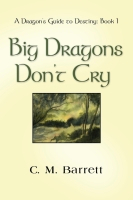| ||||||||||||
| Category: Fiction:SciFi Fantasy Horror |
(requires Adobe Reader)
|
| About the Book | |
|
In Big Dragons Don't Cry, a cunning opportunist and would-be tyrant wants to turn a swamp into valuable real estate. Druid, the large and very depressed water dragon who protects the swamp and its inhabitants, vows to save his friends and his home--although he's sure he'll fail. In a nearby meadow, Tara, an unruly and daring kitten who charms every animal she meets, has been groomed to turn up the adorability factor so that she can reach Serazina. The human's emotional empathy may both enable her to communicate with other animals and earn her a lifetime stay in the Ward for the Chronically Crazy. Serazina needs the animals' insights, but she must abandon her belief in human superiority before she can understand them. Once the dragon, kitten, and human meet and put their various-sized heads together, they discover plans to exterminate both Druid and Phileas, the Guardian of Oasis and master of mental control. The tyrant will seize power unless Phileas loses his mind, finds his heart, and joins forces with the unlikely trio. Although I wrote Big Dragons Don't Cry well before the oil spill in the Gulf of Mexico, the novel's story highlights the separation between humans and the rest of life that allows ecological disasters to unfold. I used the medium of fantasy to imagine new possibilities: What would the world be like if humans and animals understood and respected each other? What could humans learn if we no longer saw ourselves as apart from nature but entered wholeheartedly into the dance of life? We might trip over our feet at first, but practice makes improvement. Fantasy author Terry Brooks says, "Good fantasy is social commentary combined with good storytelling . . . The stories take place in an imaginary world. But those worlds mirror our own and tell us things about ourselves that need to be said and understood." While I wrote Big Dragons Don't Cry to entertain readers, I hope the book will also help further a deeper understanding about how humans need to change our relationship with the earth and its inhabitants.
|
|
| About the Author | |
 |
C. M. Barrett lives in upstate New York on a piece of wooded land similar to some of the areas in Big Dragons Don't Cry. Many of the characters in the book have passed by her window. Some she hopes never will. She brakes for dragons. |

